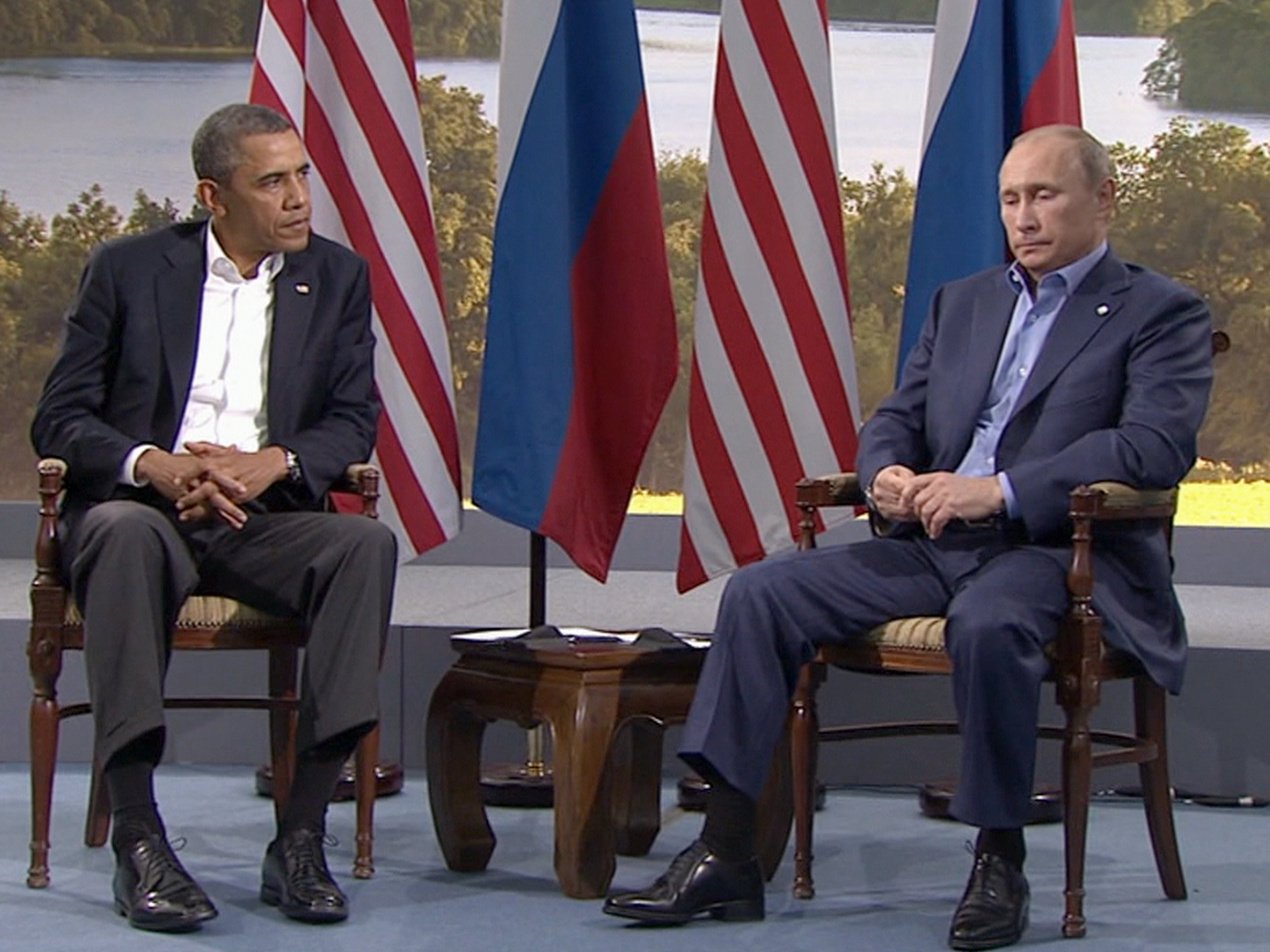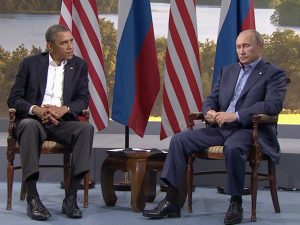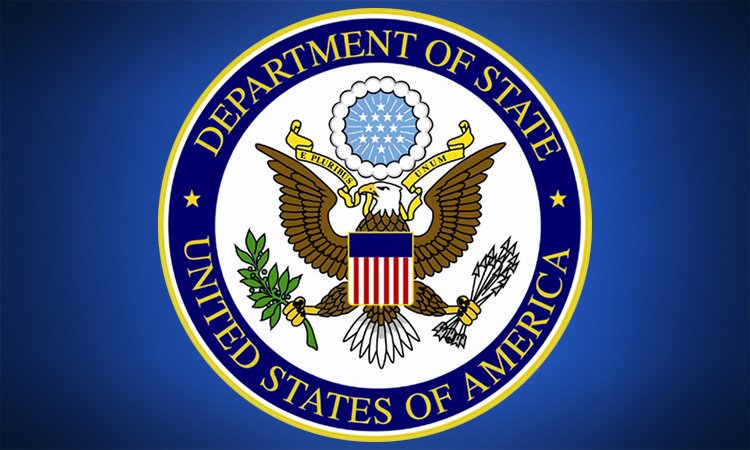By: Andrew Peoples
With this year’s tense G20 summit now concluded, relations between the United States and Russia are at their lowest point since the fall of the Soviet Union. President Vladimir Putin of Russia concluded the meeting of the world’s most powerful countries with a pledge of continued support for the embattled Syrian regime, and a warning of dire consequences for the West if it dares to intervene in the conflict. From the ban on American couples adopting Russian children to what can be described as an escalating proxy war in Syria, the new era in US-Russian relations promised by President Barack Obama looks ever more like a lost dream.
President Obama took office in 2009 with a promise of a “reset” in relations between the United States and the Russian Federation based on the idea that with the Iraq War drawing to a close, the two countries could work together to pursue mutual interests around the world without feeling threatened by one another. Since that declaration, however, the nations’ relationship with one another has become considerably colder.
The sources are both real and imagined. While the most recent and most serious cause of the rift in the countries’ relationship comes from the civil war in Syria, the origins of the heightened tensions come from another civil war started by the Arab Spring—the conflict in Libya. Despite backing a United Nations resolution to protect civilian lives in Libya, President Putin was angered by the overthrow and death of Muammar Gaddafi that followed. Stung by perceived trickery from the West, the Russian leader has been adamant that he will not allow a similar solution to be allowed in Syria.
President Putin also blamed the United States for the wave of protests against his leadership that broke out within his own country in 2011. The Kremlin responded to the protests by passing a law labeling nonprofits such as human-rights groups that receive foreign funding as “foreign agents” and allowing the government to fine them up to 1 million rubles ($30,000) for violations such as “hate speech” in published materials. The law especially singles out election watchdogs, such as Golos, an organization funded by two American agencies. Because little domestic money is donated to organizations that oppose the government, limiting international funding has made it more difficult for these groups to operate, and sent a message to the United States that efforts to promote competitive elections in Russia will not be tolerated by Putin’s government.
The “foreign agents” law is only one of several Russian laws aimed partially at spiting the United States, the pettiest of which involves a ban on American couples adopting Russian children. The ban was widely seen as a response to the American “Magnitsky Act,” which prevented certain Russian officials from entering the United States or putting their money in American banks. The American law was intended to punish tax officials in Russia involved in the arrest and subsequent suspected murder by police of a lawyer, Sergei Magnitsky, who published materials describing the officials’ corrupt practices. The Magnitsky Act was passed over the protests of the Obama administration, which feared retaliation from the Russians. The Russian ban on American adoptions leaves the 740,000 children not in parental custody in Russia unable to be sent to the country that formerly adopted more of them than any other nation, and suggests that retaliation did indeed come.
The icy relationship between the two countries has grown worse in the past few months. In addition to opposing the United States on the international stage over for a combination of ideological and pragmatic reasons over Syria, Russia has aligned itself with causes that make little sense for it to support, seemingly merely to anger President Obama and the United States. Such is the case with Edward Snowden. Freedom of information is far more limited in Vladimir Putin’s Russia than in the United States, yet it granted asylum to the famous data-leaker Snowden to protect him from U.S. prosecution. President Obama accused Russia of slipping back into a “cold war mentality” over the issue, and responded by canceling a bilateral meeting with President Putin in Moscow before the start of the G20 summit.
While much of the tension between the United States and Russia right now clearly comes from the leadership of the two nations, it also partially reflects the underlying cultural differences of the countries. Russia’s new law cracking down on gay rights activism, widely condemned throughout the West, is a reflection of a society in which gay pride parades are regularly attacked by reactionary vigilantes, which stands in sharp contrast to the gathering speed with which gay marriage is gaining acceptance in the United States. The law is seen by many observers to be a political ploy to shore up support for President Putin in his conservative base, yet it demonstrates that Russian society is willing to accept fewer personal freedoms than Western society is. Putin’s plan since returning to the presidency has been to shore up his support through the promotion of traditional Russian values and conservatism, grounded in reverence for the Orthodox Church, nostalgia for lost greatness, and distrust of outsiders. His ratcheting up of Russian-American tensions can be rightly seen as a series of political ploys to increase support for his own paternalistic government by inciting fear and hatred of the West. To many within Russia, the nationalistic turn taken by the country is putting it on the right track. However, the surge in protests in the past several years indicate that support for President Putin and his vision for Russia is declining, particularly among the Russian middle class.
Not since the Soviet Union invaded Afghanistan have these two nations quarreled as fiercly as they are over the Syria question. Since the USSR’s Christmas 1979 invasion, the two nations have not been openly involved in a proxy war. Yet the tepid U.S. support for the regime’s opponents and Russia’s widely condemned arming of the government heralds the beginning of a new and dangerous dirty war. With the United States considering more direct intervention, the situation is eerily reminiscent of the Cold War. Now that the Syrian regime has agreed to give up its chemical weapons, tensions have decreased a bit, but the United States and Russia remain on opposite sides of the fighting, and the countries will be on poor terms as long as the war rages on.
Vladimir Putin wrote in a recent op-ed in the New York Times that his “working and personal relationship with President Obama is marked by growing trust.” The main purpose of the editorial, however, was to argue against American action in Syria, and the piece drew attention to the major differences in American and Russian foreign policy. Putin even took a redundant jab at the idea of American exceptionalism immediately after his comment about President Obama, writing “it is extremely dangerous to encourage people to see themselves as exceptional.” Whatever President Putin may pretend, the differences between his country and the United States have created a serious rift that will divde the international community until it is mended.



